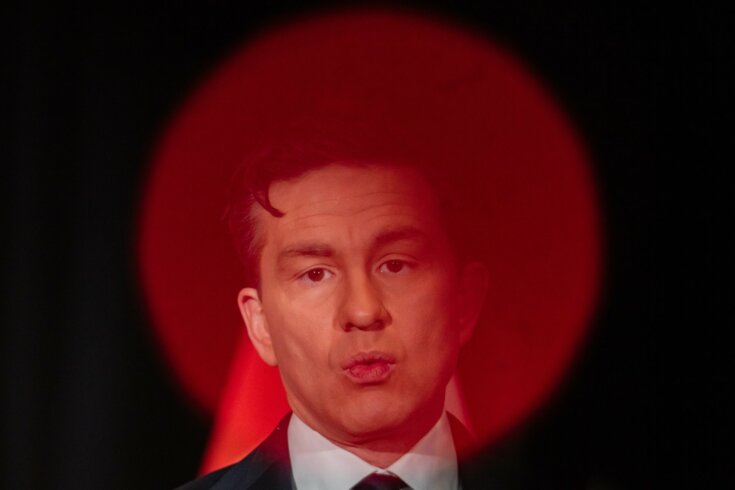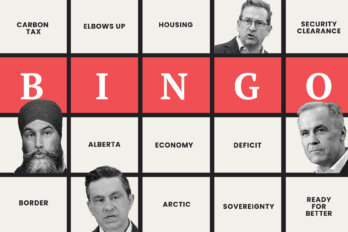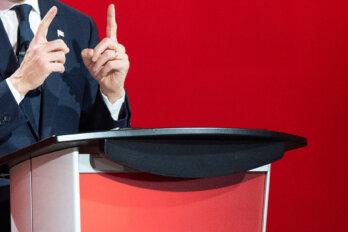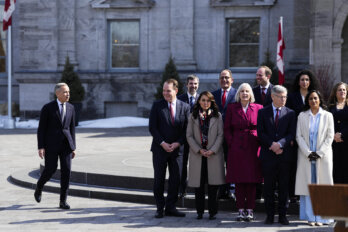I’ve known Pierre Poilievre for twenty years. Or, rather, for most of the past twenty years, I thought I knew Pierre Poilievre.
In 2003, I was working at the National Post. One day in my column, I briefly made fun of Stockwell Day, the former Canadian Alliance leader who was now the party’s lead critic for foreign affairs under the new leader, Stephen Harper. Except Day preferred to call himself “shadow minister, foreign affairs.” This sounded grander than “critic for foreign affairs,” and in my column, I suggested Day was putting on airs.
I received an email from a political staffer I’d never heard of. Pierre Poilievre was twenty-three and working in Day’s office. “Thanks for mentioning him,” the young staffer wrote. I liked the instinct: fearless and cheeky.
A few weeks later, I met Poilievre in person at Darcy McGee’s, an Irish pub near Parliament. He was friendly, an easy and charming conversationalist.
Over the years that followed, Poilievre and I occasionally chatted. Harper and Peter MacKay built a new united Conservative Party in 2003. Harper led the new party through five election campaigns, including his victories in 2006, 2008, and 2011. Justin Trudeau’s win in 2015 meant a decade in opposition for the Conservatives. Poilievre and I would run into each other on Parliament Hill or at social events. He was one of many sources for my two books about Harper. A few times, we met at La Bottega Nicastro, an Italian lunch counter in the Byward Market, simply to enjoy strong coffee and to gossip about politics. I am not claiming a close relationship. Poilievre clearly knew the staff at Nicastro, whom he would greet warmly, at least as well as he knew me. I probably knew thirty MPs as well as I knew him.
Other journalists had similar access to Poilievre, which is unsurprising because dozens of reporters in Ottawa talk to dozens of MPs and cabinet ministers. Poilievre was unusually intelligent. He was very conservative, but not outside the mainstream of Canadian political thought.
In private, he was unfailingly courteous. In 2018, Maclean’s magazine organized the annual Parliamentarian of the Year awards, with MPs themselves voting to recognize colleagues in several categories. Poilievre’s peers selected him as “Most Knowledgeable MP.” He arrived at the award party a few minutes late, with his wife, Anaida, and their baby daughter, Valentina. He apologized profusely to me for being late.
In public, it was often a different story. He can be belligerent, pompous, contemptuous of politicians from other parties. Again, that’s hardly rare. But for years, reporters who knew him often preferred not to interview him, because any recorded conversation with Poilievre would quickly become show business. Political speech always has an element of theatre, but anyone interviewing Poilievre had the disorienting and not entirely pleasant sensation of watching the private man disappear for a few minutes while a persona came out to speak.
At some point, the private man disappeared entirely, at least from me. Our last email exchange was in 2020. Since February 2022, when he announced his candidacy for the Conservative Party’s leadership, we have not had a conversation. My occasional requests for interviews with the candidate, and then with the leader and likely next prime minister, have been ignored or politely declined by Poilievre’s staff. For this article, I gave his office a choice: I could tell readers what to think about him—or Poilievre could tell them himself, by sitting for an interview. You’re stuck with me. In November, Poilievre and I were on the same Porter flight from Toronto to Ottawa. He seemed not to see me, though he paused in the aisle to chat amiably with the man sitting directly behind me.
I don’t mind. He’s working on winning. Until he wins, he will not relax in public, not once.
The most important thing to remember about Pierre Poilievre—the best explanation for anything he does that might confuse you or seem strange—is that he believes he has no right to lose the next election.
This is not merely a question of pride or competitive instinct. If Poilievre were to lose the election, he would become the fourth consecutive Conservative leader to lose to the Liberals. The first three were Harper, Andrew Scheer, and Erin O’Toole. Losing four times to the Liberals would be worse than an embarrassment. Some people would conclude the modern Conservative Party, as built by Harper and MacKay in 2003, is of no use for the purpose it was built for. Its survival as a united party would be at risk. Progressive Conservatives in the mould of Brian Mulroney, Joe Clark, or Jean Charest would wonder why they bother to put up with Western populists increasingly influenced by Fox News and vice versa.
People close to Poilievre tell me he never stops thinking about this obligation to return the party to power. So if doing something will help him win the coming election, he’ll do it. And if not, he won’t. He refuses to meet ambassadors stationed in Ottawa because nobody votes for a party whose leader is nice to diplomats. He won’t meet most business leaders or Indigenous leaders for the same reason.
This explains what he won’t do—the chances he won’t take, the time he won’t waste talking to people who seem important but can’t move him closer to power. But how do we explain how he acts? Why is he so casually insulting to so many prominent Canadians? He called Trudeau’s support for drug decriminalization in BC “wacko.” He called Montreal mayor Valérie Plante “incompetent.” He repeatedly said he would fire Bank of Canada governor Tiff Macklem for letting inflation get out of control. He called the CEO of BCE Inc. “overpaid.” His MPs routinely call the speaker of the House of Commons, Greg Fergus, a Liberal partisan. He’s urged businesses to fire their lobbyists.
At times, it seems there’s nobody he won’t pick a fight with. But that’s not quite true. He is patient and generous with the people who come to his rallies. He often stays for more than an hour after an event finishes so he can chat and take photos with anyone who wants to. He was friendly with all the other passengers on the Porter flight where he didn’t see me. And I’m told he consults with select MPs, and even with candidates who haven’t yet been elected to Parliament, before making important decisions.
What explains the difference? Simply this: Poilievre is full of studied and theatrical disdain for the sort of people whose lives seem impossibly distant from those of ordinary Canadians: business executives, government leaders, anyone with membership in any exclusive club. For the people who are left out, he has all the time in the world.
“I think when politesse is in conflict with the truth, I choose the truth,” he told a Montreal Gazette reporter last June. “I think we’ve been too polite for too long with our political class.”
Of course, he makes exceptions. There is an element of theatre in everything he does. A friend of mine is a prominent Toronto banker. On social media, he posted a photo of Poilievre, wearing a more elegant suit than he usually wears, smiling graciously as the banker and his friends welcomed him to a sold-out fundraiser at a private home in Toronto. One presumes nobody in that house was told they are overpaid, wacko, or incompetent.
But most of the time, when he is out in public where everyone can see him, Poilievre makes a public display of his disdain for money, power, and privilege, because he understands that most people have none of these things. All they have is a vote.
He does not come before this bewildered majority as their social superior, here to correct the errors of their ways, but as the perfect instrument of their revenge.
“After eight years of Trudeau, life is increasingly a living hell for the working-class people of this country,” he said during a 2023 speech to the C.D. Howe Institute in Toronto. “Now, often people hear these sorts of statements, in rooms like this, and they think it is hyperbole. That is one of the fundamental problems with our country today.”
“There is a group of people who do not experience the misery and the suffering that the everyday Canadian is living on the ground,” he continued. “And as a result, when they hear me talk about it, they have a hard time appreciating and understanding it.”
It’s an unusual way to run for power, especially for a guy who does not believe he can lose. He describes life for most Canadians as misery, suffering, a living hell—and then he takes pleasure in making life uncomfortable for people whose authority is not often questioned.
There’s precedent. In his 2008 book Nixonland, the historian Rick Perlstein describes the rise of Richard Nixon, another awkward outsider fuelled by resentment. At Whittier College, the California school where he earned his undergraduate degree, a young Nixon found student politics dominated by a fraternity called the Franklin Society, named after Benjamin Franklin. Perlstein writes that the Franklins were everything Nixon wasn’t: “well-rounded, graceful, moved smoothly, talked slickly.” Rather than try to break into that exclusive club, Nixon simply formed his own club, which was open to everyone left out, the Orthogonians. The name was mashed together from two ancient Greek words and meant, approximately, “straight shooters.” When Nixon beat a member of the Franklins in the election for student body president, he showed that “being hated by the right people was no impediment to political success.” The rest of Nixon’s career was a series of appeals to Orthogonian tastes.
In America after the Second World War, the relatively small upper class of inherited wealth saw the rapidly growing middle class as awkward and uncultured. That’s because they often were. But the clumsy baby boomers also outnumbered the children of privilege. For them, Perlstein writes, “admiring Richard Nixon was becoming part and parcel of a political identity based on seeing through the pretensions of the cosmopolitan liberals who claimed to know so much better than you (and Richard Nixon) what was best for your country.”
When I wrote about Perlstein’s book in 2008, I drew a comparison between the clumsy but strategically brilliant Nixon and a young Conservative MP from a mostly rural Ottawa riding who, at that point, was not even a member of Harper’s cabinet: Pierre Poilievre. The kid was “dismissed as a third-rater by most reporters in the gallery,” I wrote then, but he understood the distinction between the elegant minority and the ungainly majority “in his bones.”
I’m told by a member of Poilievre’s entourage that when I repeated the comparison between Nixon and Poilievre in 2022, the new Conservative leader was pleased.
Of course, if clumsiness were all it took to win an election, then I would be prime minister. Resentment of what Perlstein called “the cosmopolitan liberals who claim to know . . . better than you” can’t become rocket fuel until a critical mass of voters feel they are governed by . . . well, by cosmopolitan liberals who claim to know better than you. A year’s worth of polls suggest that, in the eyes of voters enough to give Poilievre’s Conservatives a majority, that condition has been satisfied.
To what end? What would he do in power? In mid-2022, Poilievre gave a rare interview to a journalist who wasn’t already won over to his cause, when he spoke to Shannon Proudfoot at Maclean’s magazine. She asked him what he sees as his role in Parliament and in the Conservative Party. He replied: “To keep the commoners the masters and the crown the servant. That is the only purpose of Parliament.” Later, she asked what the ends of his political work are. “The ends is to make Canada the freest country in the world,” he said.
It might sound like jousting. I believe it’s from the heart. He really does believe that government is best when it governs least. And unlike many Conservatives whose convictions are dulled over time, Poilievre’s have, if anything, been sharpened.
In his 2024 book, Poilievre’s biographer Andrew Lawton points out that throughout the Harper years, Poilievre was part of a group within the Conservative caucus that met weekly to look for ways the government could be more conservative. The little group was nicknamed the Khmer Bleu, an ironic reference to the doctrinaire communist Khmer Rouge that governed Cambodia in a regime of bloody violence in the 1970s. Harper quietly encouraged the group, because he knew there would be other MPs, often from Quebec, who would speak up to defend any government program against proposed cuts. Harper wanted to hear from a group that would always want more cuts.
For our purposes, what’s important about this old story is that, for almost the entire time the Harper Conservatives were in government, Poilievre was assigned—by Harper himself—to view Harper’s work as too timid.
In time, this became the consensus view among most Conservatives. Harper believed he could change Canada’s political culture by simply enduring in power. Eventually, Canadians would come to accept Conservative governments as normal, Conservative assumptions as natural. So any compromise Harper made to hang onto power was worth it, because it extended Canada’s experience with Conservative government by another day. His goal was erosion, not revolution.
But in the end, Harper’s longevity changed little in Canada’s political culture. If anything, Trudeau felt freer to provide big government, or at least busy government, than any of his Liberal predecessors had. In Poilievre’s entourage, Harper and most of the people who worked in his office are thought to have been too slow to challenge conventional wisdom, too nervous about aggressively cutting back the federal government.
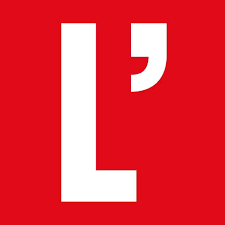
This story was originally published as “Les deux visages de Pierre Poilievre” by L’actualité on January 29, 2025. It has been reprinted here with permission.
Indeed, I am told by multiple sources that one person who shares this critical view of Harper’s government is Stephen Harper. And he has not been shy about telling Poilievre to be more aggressive than he was.
What will that mean concretely? Even in Conservative circles, nobody is sure. But the future of the CBC is seen as a test of the Poilievre style. Advisers who urged him to be slow and careful in his plans to “defund” the public broadcaster have been pushed out of his inner circle. Poilievre told them: I am not Erin O’Toole, and if that’s the kind of advice you have, you won’t be giving me any more advice. There are still a lot of questions about how, precisely, a Prime Minister Poilievre would “defund” the CBC. Including whether any of the cuts would affect Radio-Canada. But we won’t have to wait to find out: it’s said that Poilievre wants to implement his plan for the CBC in his first 100 days.
After those first 100 days, a majority Poilievre government would have 1,360 more days in office. And he plans to use them.

